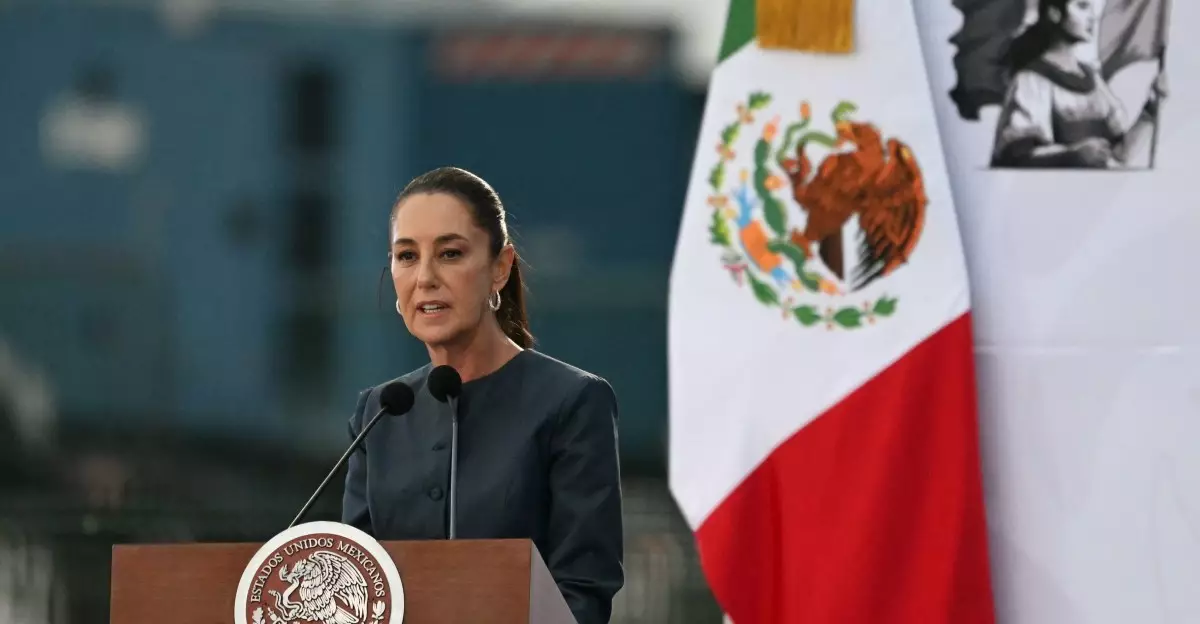The ongoing saga surrounding the name of the Gulf of Mexico, or as it has controversially been dubbed by some, the Gulf of America, highlights an intriguing intersection of geopolitics, digital monopolies, and cultural identity. This debate, reignited after Mexican President Claudia Sheinbaum’s fierce denouncement of Google’s name alteration, reflects how people view territorial nomenclature as more than mere semantics—it touches upon national pride and sovereignty. The implications of this name change ripple through historical contexts and national sentiments, underscoring the broader conflicts of authority between countries and non-governmental entities.
Understanding the Roots of Discontent
At the heart of this controversy lies President Trump’s administration, which, in an effort to assert a distinctly American identity, proposed a shift in the nomenclature of geographic entities. This push for the Gulf of America not only seems to be an attempt to redefine American identity in a global landscape but also symbolizes a fundamental misunderstanding of international representation. Claudia Sheinbaum’s government has argued vehemently that such a change is flawed and overreaches, as names of international waters cannot be dictated solely by U.S. interests. This conflict stems from a desire for recognition and respect for the historical boundaries that define the region.
The situation brings to light how digital platforms like Google wield significant power over information dissemination. When Google Maps chose to adopt the Gulf of America label, it reflected a compliance with governmental pressures while simultaneously disregarding the cultural implications for those from affected nations. The move exemplifies the troubling ability of tech companies to navigate politics while distancing themselves from accountability.
The Law and the Courtroom: A Struggle for Justice
In response to Google’s stubbornness, Sheinbaum announced legal action to compel compliance with international naming conventions, further escalating tensions between Mexico and the United States. This legal maneuver is not merely about forcing a platform to revert back to a familiar name; it signifies a broader fight for recognition and autonomy in a digital age where corporations often have more reach and influence than nations themselves. By choosing to sue, Mexico is striving to reclaim authority over its own geography from a foreign tech giant that seems to operate without regard for international consensus.
Reports suggest that Sheinbaum’s administration had initiated dialogue with Google, seeking voluntary compliance. However, the subsequent lack of action prompted this litigation, a clear indication that diplomatic attempts were insufficient. Mexico’s assertion that the U.S. government cannot dictate the terminology for a shared international body of water emphasizes the belief that national borders extend beyond physical demarcations—they encompass identity and culture.
The Broader Implications for Digital Sovereignty
The controversy surrounding the naming of the Gulf reveals a critical issue facing nations in the current geopolitical landscape: the role of digital sovereignty. As tech companies continue to expand their influence, countries like Mexico may find themselves increasingly challenged to defend their identities against corporate interests. The name “Gulf of America” does more than designate an area on a map; it sends a signal that reshapes perceptions and invokes identities that many nations wish to preserve.
Moreover, this conflict illustrates how efforts to rebrand geographic locations can lead to widespread misinterpretations. Naming a place is not a neutral act; it carries historical, emotional, and political baggage. Sheinbaum’s strong statements resonate not only with those in Mexico but also with a global audience who recognize that territorial identity must be respected in the face of powerful international entities.
Corporate Responsibility Amidst Global Challenges
In light of the fallout from the name change, there is a mounting urgency for corporate entities to address the social responsibilities that come with their influence. Google’s choice to ignore the sentiments of an entire nation in favor of complying with governmental pressure raises questions about ethics and accountability in the tech industry. When corporations start to dictate geographical narratives, they encroach upon the rights of sovereign nations to define their own identity.
As this legal battle unfolds, it could set a significant precedent for how digital platforms interact with national identities. Will Google reconsider its approach, or will other nations face similar dilemmas in the future? The world is now watching closely, as the outcome of this case could redefine not just relationships between states but also the power dynamics with data giants that have become integral players on the geopolitical stage.

